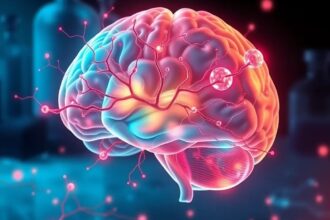A clinical trial at UC San Diego investigates how time-restricted eating may slow Huntington’s disease progression by improving metabolic health and reducing neuroinflammation.
Researchers launch first clinical trial testing time-restricted eating as potential therapy for slowing Huntington’s disease progression.
Groundbreaking Trial Tests Time-Restricted Eating for Huntington’s Disease
The Promise of Metabolic Interventions
Researchers at UC San Diego have initiated a landmark clinical trial (NCT05637818) investigating whether time-restricted eating (TRE) can slow disease progression in early-stage Huntington’s disease (HD). This comes amid growing evidence that metabolic interventions may complement traditional approaches to neurodegenerative disorders.
We’re seeing remarkable preclinical data suggesting TRE can reduce mutant huntingtin protein aggregation by up to 30%,
says Dr. Sarah Andrews, principal investigator of the trial, referencing the 2024 Nature Aging study. This trial will tell us whether these benefits translate to human patients.
Trial Design and Innovations
The 12-month study will enroll 50 participants with early-stage HD, randomly assigned to either an 8-hour TRE window or normal eating patterns. Researchers will track:
- Biomarkers of metabolic health (using continuous glucose monitoring)
- Motor and cognitive symptom progression
- Neuroimaging changes
- Quality of life measures
Notably, the trial incorporates advanced monitoring technologies rarely used in previous HD studies. We’re particularly interested in how TRE affects circadian rhythms in HD patients,
explains Dr. Mark Chen, co-investigator. Disrupted sleep-wake cycles are an understudied aspect of disease progression.
The Science Behind Time-Restricted Eating
Metabolic and Cellular Mechanisms
A February 2024 review in Cell Metabolism detailed how TRE enhances autophagy – the cellular “cleanup” process crucial for removing toxic proteins like mutant huntingtin. The proposed mechanisms include:
- Improved insulin sensitivity reducing neuronal stress
- Enhanced mitochondrial function in vulnerable brain regions
- Reduction in neuroinflammatory markers
- Activation of protective metabolic pathways
Dr. Elena Martinez from the Huntington’s Disease Society of America notes: What excites us is that TRE might address multiple pathological processes simultaneously – something most drug therapies can’t do.
Synergy With Emerging Therapies
The trial comes as several huntingtin-lowering drugs show promise in clinical trials. Researchers speculate TRE might enhance these treatments’ effectiveness. By improving neuronal metabolism, we may create a more favorable environment for huntingtin reduction therapies to work,
suggests Dr. Andrews.
This hypothesis gained support when the Michael J. Fox Foundation recently awarded $2 million to study similar approaches in Parkinson’s disease, signaling broader recognition of metabolic interventions’ potential.
Changing Treatment Paradigms
Growing Acceptance of Lifestyle Interventions
HD Insights reported a striking shift: 68% of HD specialists now recommend dietary interventions, up from 42% in 2020. This reflects:
- Stronger evidence linking metabolic health to neurodegeneration
- Patient demand for complementary approaches
- Disappointing results from some pharmaceutical trials
However, experts caution that TRE isn’t a cure. This is about potentially slowing progression and improving quality of life,
emphasizes Dr. Chen. Patients should view it as part of a comprehensive care plan.
Practical Considerations for Patients
For HD patients considering TRE, researchers advise:
- Consult your neurologist first – calorie needs vary in HD
- Start gradually (e.g., 12-hour window)
- Monitor weight and symptoms closely
- Time medication schedules carefully
The UC San Diego team expects preliminary results by late 2025. If positive, this could mark a turning point in how we approach neurodegenerative diseases – treating not just the brain, but the whole body’s metabolism.




